FHI 360: BUILDING SUBSTANTIAL SOLUTIONS THROUGH WOMEN EMPOWERMENT
AN IHANN SUCCESS STORY
The Coronavirus pandemic presented tremendous challenges for everyone, everywhere. For an estimated 1.9 million internally displaced persons affected by the Northeast humanitarian crisis, lives and livelihoods were at a greater risk with the pandemic. Aside from the humanitarian situation, the already struggling Nigerian economy had to grapple with curtailing the impact of the pandemic, especially on healthcare services and livelihoods.
The Nigerian government enforced the lockdown during the onset of COVID-19 posed a threat to IDPs as restrictions in and out of the camps limited them from engaging in farming – the people’s mainstay, thus increasing IDPs dependence on humanitarian aid. As the number of infections increases, humanitarian actors had to innovate to meet the evolving needs.
Women who are primary caregivers in the community were most affected, increasing their safety concerns and vulnerability in them awellbeing. Providing women who make up over 50 percent of the IDP population with livelihood becomes salient.
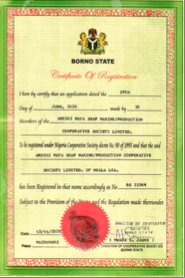
FHI 360, through the COVID-19 project, engaged already trained women from the sister project GBV safe spaces to produce 20% of the soap in the hygiene kit items to support IDPs. The opportunity would help them reduce the burden on providing for their families, improve their wellbeing, and move towards finding a durable solution.
60 women in Banki, 70 women in Ngala, and 60 women in Dikwa organized themselves, registered as a women cooperatives to locally produce soaps in the respective location. The soap production, since its commencement, has renewed the women’s hope to be productive and independent.
Mairamu Alhaji Hassan, a member of the women empowerment group in Banki, was nominated as its leader. She has been consistent since the set-up and encourages other women’s participation.
“I believe that if more women are empowered, all families will benefit. I hope from learning to produce soap and support from the cooperative that I will someday become an entrepreneur. Then also own a center to train other women to be empowered”, she said.
For Izzah Abatcha, a member of the women’s group, the money made from the sales means her and her family’s needs would be met. She said, “With these skills and business, we can help provide for our children and ensure they have an education.”
Through hard work and dedication, they have produced 13,771 soaps of the required 19,200. FHI 360 has purchased and distributed 7,944 soaps as part of the replenishment hygiene kit to the community. Approximately 1,986 individuals from 331 households benefitted.
While FHI 360 and other implementing partners have continued providing and distributing hygiene kits to vulnerable groups, several persons reported that they never benefitted from distributing these items.
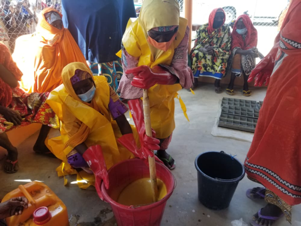
Zainab Malum, a mother of four children residing in the Banki IDP camp, said she hadn’t been a beneficiary of hygiene kit until recently. She said, “I have not received any items like soap and jerrycan distributed since I came to the camp. My husband tries to provide for my children and me, but it isn’t easy. I am happy to have received soaps and jerrycan for my family’s daily usage.
I appreciate FHI 360 for remembering me and coming to my aid. Since FHI 360 has told us that they will still be distributing these items after some months, I will no longer sell my food items to buy soap again”.
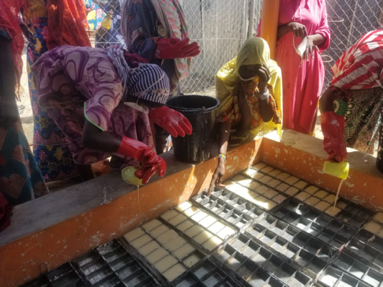
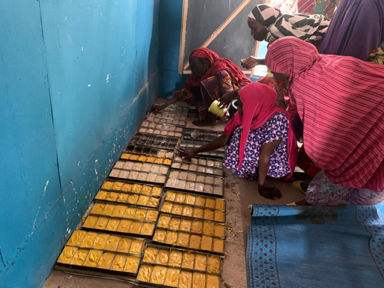
Cross-section of women during soap-making activities at the IHANN GBV safe spaces in Ngala. Photo credit: FHI 360
The soaps as part of the hygiene kits contribute to improving the overall health and wellbeing of IDPs. It has also helped to prevent possible infection and spread of coronavirus in the implementing locations.
With these women groups’ engagement and set-up, more people will get help, empower the community to support themselves and deliver greater hope for tomorrow.
The Emergency Prevention and Preparedness for COVID-19 in Northeast Nigeria and Integrated Humanitarian Assistance to Northeast Nigeria projects are funded by the USAID’s Bureau for Humanitarian Assistance.


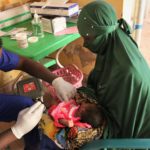

Keep it up the good work, this is a great development to the beneficiaries especially in the northeast, because women are of disadvantaged in our societies, as such this kind of empowerment activities will support them to live a better life.